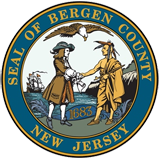Automotive Technology - Hands-on experience helps students learn skills that are fundamental to the automotive technology field. Practical work exposes students to the challenges presented by routine maintenance, diagnosis of problems and procedures for repair of today's automobiles and light trucks.
The Automotive Technology program is a technical program of study that concentrates on a wide range of competencies necessary for the automotive field. Students learn basics such as shop safety, use of tools and equipment, routine repair and vehicle maintenance. Instruction progresses to include the systems of current model automobiles and light trucks, vehicle systems diagnostics, technical reading skills, use of print and online manuals and technical research. Instructors work with students to increase their range of knowledge and skill through demonstrations, simulations and live work. The training facility is up-to-date and offers students a simulated work environment.
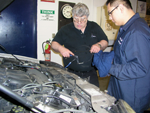 Instructors follow a National Institute for Automotive Service Excellence curriculum. The school tracks stu dent development through a series of competencies and projects that support the ASE course of study. The Automotive Technology program prepares students for work in the automotive field, for postsecondary education and/or for Automotive Service Excellence (ASE) examinations. ASE certification is a recognized professional standard in the automotive service industry and students are encouraged to pursue this recognition.
Instructors follow a National Institute for Automotive Service Excellence curriculum. The school tracks stu dent development through a series of competencies and projects that support the ASE course of study. The Automotive Technology program prepares students for work in the automotive field, for postsecondary education and/or for Automotive Service Excellence (ASE) examinations. ASE certification is a recognized professional standard in the automotive service industry and students are encouraged to pursue this recognition.
Automotive Collision Repair - Students develop expertise in the skills and techniques required for the auto body repair field. Hands-on projects include work on both automobiles and light trucks.
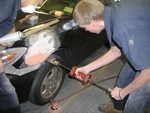
The Automotive Collision Repair program follows a curriculum recommended by the National Institute for Automotive Service Excellence (ASE). The school tracks student development through a series of competencies and projects that supports the ASE course of study in automotive collision repair. Students prepare to take the ASE examinations which lead to ASE certification. ASE certification is a recognized professional standard in the automotive service industry today and students are encouraged to pursue this recognition.
Study in this program includes both theory and hands-on work. Students become experienced in working with auto body fillers, rust proofing materials and primers. Through live work, students learn to remove and replace glass and trim and to spot paint or refinish repaired areas of vehicles. Students learn how to maintain acceptable working conditions, interpret work orders, use hand and power tools, use welding equipment, straighten damaged areas of vehicles and remove and replace 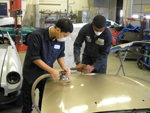 vehicle parts. By the end of the program, students become adept in meeting the demands of today's sophisticated collision repair industry. Program completers take ASE examinations, find field employment or continue their education in a postsecondary school or college.
vehicle parts. By the end of the program, students become adept in meeting the demands of today's sophisticated collision repair industry. Program completers take ASE examinations, find field employment or continue their education in a postsecondary school or college.
Cosmetology - This program involves studies of the hair, scalp, skin and nails. Students work to become well prepared to meet the examination requirements of the New Jersey State Board of Cosmetology.
The curriculum followed in the Cosmetology program prepares students to meet the examination and licensing requirements of the New Jersey State Board of Cosmetology. In addition to theory and classroom work, specialized training is provided through the use of mannequins, demonstrations and live models.
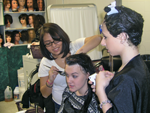 Cosmetology is all about style, health, visual effect and what it takes to achieve that perfect look. Students learn how to select hairstyles that suit the physical features of the patron and how to adapt current styling trends for the individual. Training concentrates on properties of hair and the physical and chemical effects of various products, such as shampoos, rinses, toning and lightening agents, curling and straightening agents and heat-activated agents such as permanents. Students learn how to work with a variety of products in the classroom cosmetology studio. Time and attention are also given to areas such as skin care, make-up, nail care, hand and arm massage, product selection and product application techniques for manicures, make-up and general skin care. Classroom theory includes the chemistry, anatomy and physiology related to the field of cosmetology, ethics of cosmetology, sanitation and sterilization and small business management.
Cosmetology is all about style, health, visual effect and what it takes to achieve that perfect look. Students learn how to select hairstyles that suit the physical features of the patron and how to adapt current styling trends for the individual. Training concentrates on properties of hair and the physical and chemical effects of various products, such as shampoos, rinses, toning and lightening agents, curling and straightening agents and heat-activated agents such as permanents. Students learn how to work with a variety of products in the classroom cosmetology studio. Time and attention are also given to areas such as skin care, make-up, nail care, hand and arm massage, product selection and product application techniques for manicures, make-up and general skin care. Classroom theory includes the chemistry, anatomy and physiology related to the field of cosmetology, ethics of cosmetology, sanitation and sterilization and small business management.
Culinary Arts - Students typically concentrate on Baking or Food Service. Students study all aspects of the field through direct application and development of skills in practical situations.
Students who select the Culinary Arts - Baking option are introduced to the field of commercial baking through direct application of skills in practical situations. Students learn to read and work with commercial recipes, including proportional resizing of recipe quantities, measuring of ingredients and mixing techniques for batters, dough, fillings and icings.Through a combination of classroom work and hands-on practice, students gain expertise in mixing, molding, shaping, designing and baking a variety of breads, pastries and other baked items.
Students who select the Culinary Arts - Food Service option are introduced to the field of commercial foods and food service. Students learn a variety of culinary and food preparation and presentation techniques using foods commonly used in both restaurants, cafeterias and institutional settings. In addition, students learn table service, dining room protocol and business operation for an overall introduction to the culinary arts - food services field.
Whether the area of concentration is Baking or Food Service, instruction in kitchen safety and sanitation, proper use of tools, small equipment, ovens and food handling and storage gives students a foundation for work in the classroom and beyond. Finally, an introduction to business operations gives students an opportunity to connect their kitchen and baking skills or culinary skills to the work enviornment. Graduates are well prepared for positions in the bakery business, commercial kitchens or other food service operation, depending upon the area of preparation and training. Graduates who have successfully completed a college preparatory academic program have the option of going on to postsecondary education.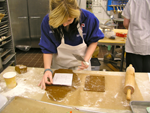
Green Building Trades- This technical area prepares students with the background knowledge and skill sets recognized by professionals in the electrical field. Hands-on projects reinforce classroom knowledge and help students build the skill precision required for work in this technical field.
The Green Building Trades incorporates the latest sustainability practices in construction, electrical design, plumping, masonry and HVAC. Students learning in the green building trades have an opportunity to work with the latest technology such as Vertical Lift Modules (VLM) and take residential construction courses sponsored by the Home Builders Institute (HBI) and National Association of Home Builders (NAHB). The program allows for multiple industry standard certifications in carpentry, plumping, and electrical, as well as certificates through the Occupational Safety and Health Administration (OSHA).
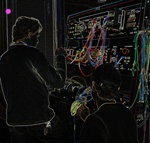
Study in this technical area prepares the student to enter the electrical profession or to pursue a post-secondary education. Students who elect this program must follow a college prep academic program.
General Contracting - Students acquire basic skills in the construction trades. In addition to trade skills, students study building codes and the environmental impact of various building materials and methods.
Students who select the General Contracting program work to develop basic skills commonly used in the construction trades. The curriculum begins with a focus on general safety, electrical safety and the proper use of hand and power tools. Students learn to interpret drawings, calculate materials and understand the various material and fastener options. Study also includes building codes, applicable laws, and issues related to the environmental impact of various building materials and procedures. Students gain skill in rough and finish carpentry and basic plumbing, as well as the wiring of electrical circuits according to code and schematics. The program also explores finishing procedures, surface preparation, and material selection. Various hand-on projects build skill and confidence in the use and application of various procedures, materials and technologies.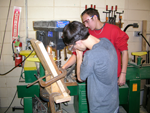
Since preparation for employment is more than skill development, the topic of employability is threaded throughout the program. Students learn how to obtain and maintain a job, practice proper job site clean up and build a working knowledge of professional ethics as related to the field of general contracting.
Computer Networking & Telecommunications - This program provides students with the skills and knowledge they need to sit for the the industry-recognized CompTIA A+ Certification Examination.

Computer Networking & Telecommunications provides students with the skills and knowledge needed to sit for the CompTIA Network+ certification exam. The CompTIA Network+ certification is a vendor neutral international industry credential that validates the knowledge of IT network professionals. The ability to attain this certification proves that a candidate has a broad base of knowledge and competency in core computer hardware, operating system technologies, telecom cabling, networking components, IP configuration, network protocols, wireless and wired networks, and basic network security. The ideal candidate for this program is a problem solver who has demonstrated a clear aptitude in academics. This is a challenging, rapidly growing field that offers tremendous opportunity for a student to pursue further education or employment.
Environmental Design -Students in the Environmental Design program gain experience and knowledge in plant materials, deciduous plants, trees, ornamentals, shrubs, evergreen plants, and ground coverings.
Moving from classroom instruction to practical applications, students learn how to place, plant, and maintain turfs, shrubs, and plantings for beautification of homes, businesses, and community areas. BCTHS/Paramus is proud to partner with Bergen Community College to offer our students the ability to gain six credits at no cost prior to graduation. This partnership exists due to the fact that our program goes far beyond simply the basic mechanics of landscaping.
The most important part of the Environmental Design program is that our students learn the fundamentals of aesthetics and are able to apply them to real world applications. Students become proficient with the essential tools for design (i.e., t-square, French curve, protractor, scale ruler as well as the state of the art Dynascape Computerized Landscape Design program), and conduct work site analysis for design.
ARTICULATED COURSES
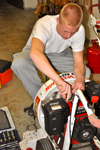
- Principles of Landscaping (Bergen Community College- Principles of Landscaping; HRT 113)
- Plants and Materials ( Bergen Community College- Landscape plants and materials; HRT 104)
Healthcare Occupations - Students will be prepared to enter the fast-growing health care field as a valuable assistant and to have strong basic skills to continue health care training in college.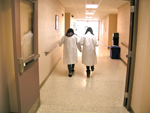
The Medical Office Assistant program allows students to become one of the most important people in the health care field. Graduates of this program will be able to move onto either post secondary studies or enter the workforce immediately upon graduation. Students will acquire the skills necessary to help with the administrative and clinical tasks needed to keep offices and clinics of physicians, podiatrists, chiropractors, and optometrists running smoothly. Study in this program will allow students to become experienced in scheduling appointments, billing, maintaining medical records, purchasing equipment, and arranging for hospital admission and laboratory services. In addition to clerical functions, students will gain experience taking medical histories and recording vital signs, explaining treatment procedures to patients, preparing patients for examination, and assisting the physician during the examination. Medical office assistants also may collect and prepare laboratory specimens or even perform basic laboratory tests, and sterilize medical instruments. They may instruct patients about medication and special diets; or they may draw blood, give injections or other treatments, and change dressings.
Skin Care & Esthetics - This program involves studies of all facets of skin care and make-up artistry, the hair, scalp, skin and nails. Students work to become well prepared to meet the examination requirements of the New Jersey State Board of Cosmetology.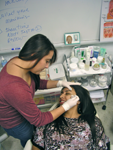
Program Description
Students specializing in Bergen Tech's Esthetician (Skin Care) Program will receive instruction in all facets of skin care and make-up artistry, including numerous methods of spa facials, hair removal, make-up application, color coordination, facial shapes, skin conditions, corrective procedures for problem skin, use of galvanic current machines, body scrubs and polishes, and entrepreneurial science associated with opening and managing a day spa. The program will feature intensive studies of the skin, hair, scalp, and nails emphasizing preventative care and treatment for skin to keep it healthy and attractive. In a unique spa setting, specialized classroom training will be provided through demonstrations, videos, and live models in clinic service.
Training will consist of skin analysis and the study in the physical and chemical effects of skin care products. Correct selection of the products for different skin types and the use of procedures for facials, with and without the use of machines will also be emphasized. Units of study will include nutrition, facials, cosmetics, hair removal and business management. Curriculum is designed to meet examination requirements of the New Jersey State Board of Cosmetology. Classroom theory includes the chemistry, anatomy and physiology related to the field of cosmetology, ethics of cosmetology, sanitation and sterilization and small business management.
Small Animal Care/Vet Tech Assistant- Students work with live animals and learn grooming, veterinary assistance and animal care in the campus small animal care facility.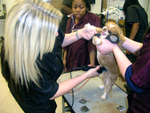
Students in the Small Animal Care/Vet Tech Assistant program learn grooming for all popular breeds of dogs and cats, general health concerns associated with dogs and cats, kennel sanitizing and disinfecting procedures and the safe handling of animals and equipment. The classroom is set-up as a small animal care facility and run as a small business specializing in animal grooming. Accordingly, students also learn office reception procedures, handling of appointments and the maintenance of a computer client database.
Upon successful completion of the program, graduates receive a performance record of skills which summarizes what they have learned. A 1,000 Hours Certificate is also awarded to students who achieve this training hour's milestone. The school arranges work experience and transition programs for students in association with local veterinary hospitals, grooming shops, boarding facilities and large pet retail stores. This aspect of the program helps students secure work upon graduation.
Media Production - This program develops creative talents in students through design technology. Students learn advanced imaging techniques utilizing digital cameras, scanners and industry-standard software
The overall goal of Media Production program is to develop the creative talents and skills of students, as well as to channel those talents and skills for marketability in today's workplaces. This is accomplished through the convergence of skill development in topography, digital and non-digital imagery with creative ideas for the design and production of attractive and effective communications. Students learn color theory, pre-press operations and print production, advanced imaging techniques using digital cameras, scanners and Adobe software (Photoshop, Illustrator and InDesign). Students also learn presentation skills through website design and construction using Dreamweaver and Flash animation software.Program Description
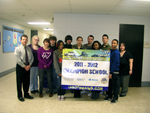
Since the workplace demands deadlines, organizational skills are stressed in the program and students learn to finish work-simulated projects on-time. Project-based learning includes advertising, editorial page design, posters, packaging, and design for books, exhibitions and websites. This program prepares students for entry-level positions in advertising, publishing, and printing industries, as well as the art departments found in corporations and businesses.
